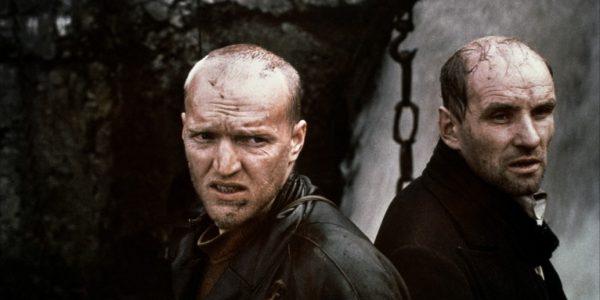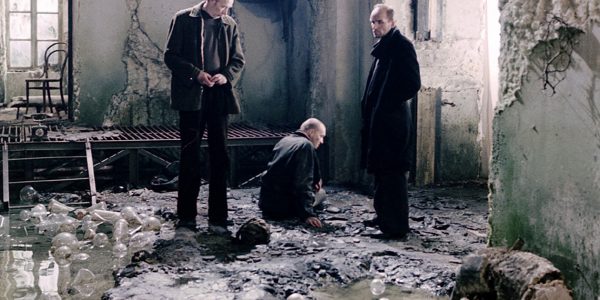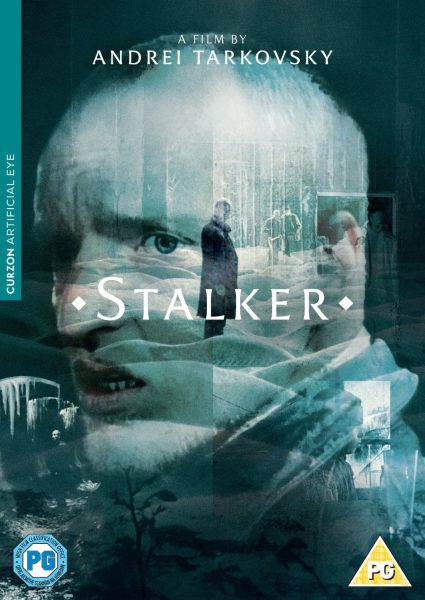Stalker DVD Review
Stalker, directed in 1979 by Andrei Tarkovsky, is a Soviet science fiction film loosely based on the novel
Roadside Picnic, written by Boris and Arkady Strugatsky. Despite its gorgeous, haunting cinematography, bold stylistic choices and thought-provoking questions of philosophy and psychology,
Stalker's grueling 164 minute runtime and lethargic pace is certainly not for everyone.
A mysterious figure known only as The Stalker (Aleksandr Kaidanovsky) offers to provide safe passage to an area called the Zone, which many believe holds the ability to grant a person's innermost wishes and desires. Two travelers, The Writer (Anatoli Solonitsyn) and The Professor (Nikolai Grinko), want to enter The Zone - one seeks inspiration, and the other scientific discovery. The Stalker agrees to lead them, but in The Zone, nothing is quite as it seems.

The world outside the Zone is shown in a high-contrast brown monochrome, a stylistic approach that not only clearly separates the two, but suggests that the Zone, for all its secrets, offers some kind of clarity that the rest of the world does not have. The unexplained nature of the Zone raises questions of morality, science, religion and psychology and forces those who enter it to confront them and themselves. Visually, the movie is astonishing, immersing the viewer in a decrepit, eerie setting. The Zone is both desolate and bursting with life, overgrown and abandoned. There's an otherworldly, surreal quality to it that Tarkovsky captures and exaggerates.
Stalker is at its best near the very end, when the three principal characters openly discuss what the existence of the Zone means to them and to humanity as a whole and coming to grips with some tough answers in the process. Unfortunately, it takes quite a while to get there.

Tarkosvky's love for long, unbroken takes and slow movement combined with a runtime just over two and a half hours makes watching
Stalker feel a lot more like an endurance test than it should. There's a lot to mine with this premise, but the narrative unfolds at a snail's pace, draining away the tension and drama. There's a meditative quality to much of the movie, but it can make for a frustrating viewing experience. The movie also gives a lot of time for the Writer to express his thoughts and feelings and conversations tend to feel pretty one-sided as a result. It's not until the final act where we reach a point where all characters seem to have an equal footing.
Although I had a much better overall experience with Tarkovsky's
Stalker than with his 1975 feature
Mirror (the former has a definite and palpable sense of structure and direction, which is entirely absent in the latter), I am now convinced that the legendary Russian filmmaker's work is not for me. I was becoming increasingly disconnected from
Stalker as time went on and I certainly feel others will find the movie difficult to sit through in its entirety.
Curzon Artificial Eye released
Stalker on Blu-Ray and DVD on the 22nd August, 2016.
 Special Features:
Special Features:
Interview with cinematographer Aleksandr Knyazhinsky
Interview with Set Designer Rashit Safiullin
Andrei Tarkovsky's Metaphysical Dream Zone: Selected Scene Commentary by Psychoanalyst Mary Wild
Amazon.co.uk (DVD)
Amazon.co.uk (Blu-ray)
Pros
- Fascinating premise
- Gorgeous cinematography
- Raises thought-provoking questions
 The world outside the Zone is shown in a high-contrast brown monochrome, a stylistic approach that not only clearly separates the two, but suggests that the Zone, for all its secrets, offers some kind of clarity that the rest of the world does not have. The unexplained nature of the Zone raises questions of morality, science, religion and psychology and forces those who enter it to confront them and themselves. Visually, the movie is astonishing, immersing the viewer in a decrepit, eerie setting. The Zone is both desolate and bursting with life, overgrown and abandoned. There's an otherworldly, surreal quality to it that Tarkovsky captures and exaggerates.
Stalker is at its best near the very end, when the three principal characters openly discuss what the existence of the Zone means to them and to humanity as a whole and coming to grips with some tough answers in the process. Unfortunately, it takes quite a while to get there.
The world outside the Zone is shown in a high-contrast brown monochrome, a stylistic approach that not only clearly separates the two, but suggests that the Zone, for all its secrets, offers some kind of clarity that the rest of the world does not have. The unexplained nature of the Zone raises questions of morality, science, religion and psychology and forces those who enter it to confront them and themselves. Visually, the movie is astonishing, immersing the viewer in a decrepit, eerie setting. The Zone is both desolate and bursting with life, overgrown and abandoned. There's an otherworldly, surreal quality to it that Tarkovsky captures and exaggerates.
Stalker is at its best near the very end, when the three principal characters openly discuss what the existence of the Zone means to them and to humanity as a whole and coming to grips with some tough answers in the process. Unfortunately, it takes quite a while to get there.  Tarkosvky's love for long, unbroken takes and slow movement combined with a runtime just over two and a half hours makes watching Stalker feel a lot more like an endurance test than it should. There's a lot to mine with this premise, but the narrative unfolds at a snail's pace, draining away the tension and drama. There's a meditative quality to much of the movie, but it can make for a frustrating viewing experience. The movie also gives a lot of time for the Writer to express his thoughts and feelings and conversations tend to feel pretty one-sided as a result. It's not until the final act where we reach a point where all characters seem to have an equal footing.
Although I had a much better overall experience with Tarkovsky's Stalker than with his 1975 feature Mirror (the former has a definite and palpable sense of structure and direction, which is entirely absent in the latter), I am now convinced that the legendary Russian filmmaker's work is not for me. I was becoming increasingly disconnected from Stalker as time went on and I certainly feel others will find the movie difficult to sit through in its entirety.
Curzon Artificial Eye released Stalker on Blu-Ray and DVD on the 22nd August, 2016.
Tarkosvky's love for long, unbroken takes and slow movement combined with a runtime just over two and a half hours makes watching Stalker feel a lot more like an endurance test than it should. There's a lot to mine with this premise, but the narrative unfolds at a snail's pace, draining away the tension and drama. There's a meditative quality to much of the movie, but it can make for a frustrating viewing experience. The movie also gives a lot of time for the Writer to express his thoughts and feelings and conversations tend to feel pretty one-sided as a result. It's not until the final act where we reach a point where all characters seem to have an equal footing.
Although I had a much better overall experience with Tarkovsky's Stalker than with his 1975 feature Mirror (the former has a definite and palpable sense of structure and direction, which is entirely absent in the latter), I am now convinced that the legendary Russian filmmaker's work is not for me. I was becoming increasingly disconnected from Stalker as time went on and I certainly feel others will find the movie difficult to sit through in its entirety.
Curzon Artificial Eye released Stalker on Blu-Ray and DVD on the 22nd August, 2016.
 Special Features:
Interview with cinematographer Aleksandr Knyazhinsky
Interview with Set Designer Rashit Safiullin
Andrei Tarkovsky's Metaphysical Dream Zone: Selected Scene Commentary by Psychoanalyst Mary Wild
Amazon.co.uk (DVD)
Amazon.co.uk (Blu-ray)
Special Features:
Interview with cinematographer Aleksandr Knyazhinsky
Interview with Set Designer Rashit Safiullin
Andrei Tarkovsky's Metaphysical Dream Zone: Selected Scene Commentary by Psychoanalyst Mary Wild
Amazon.co.uk (DVD)
Amazon.co.uk (Blu-ray)